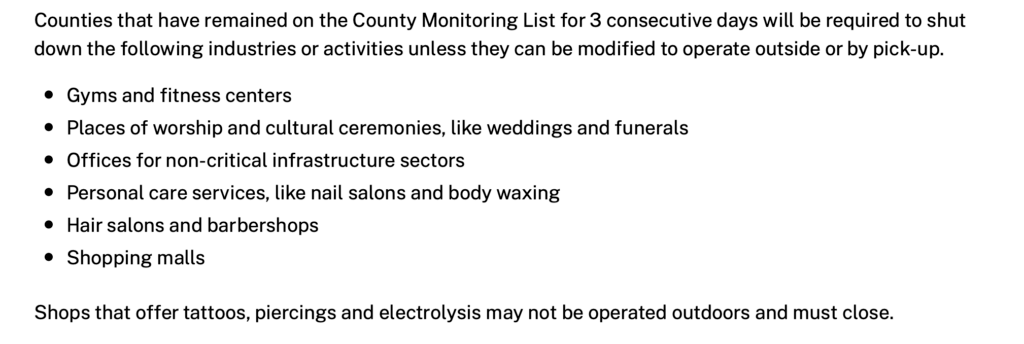Establishing Equity Between
Public Safety and Public Worship
How do we, as followers of Jesus Christ, balance our submission to God who commands us to gather for worship, our embrace of America’s constitutionally-protected right of the free exercise of religion, and our obligation to love our neighbors and keep them safe from unnecessary suffering and death?
These are the very questions we as Christians are facing in our decisions about reopening our churches for public worship. As the novel coronavirus continues to threaten multiple communities across the United States, some states, counties, and cities are attempting to halt its advance through stringent legal limitations. These kinds of limitations often affect worshipping communities most directly as other larger forms of gatherings remain either uncontested, such as during the recent protests, or less severely limited, such as the continued use of casinos. Nowhere has the spotlight on the limitation of government over the free exercise of religion been greater than in the state of California where the actions of certain counties sparked cries of outrage and claims of persecution by several pastors and churches.
When you read California’s online regulations, you can see the categories among which religious services are placed:
Authorities in California have in effect deemed places of worship “non-essential.” Although Christians are rightly outraged, the prohibitions on indoor public worship affects Muslims, Jews, and other religious communities as well. Is this a thoughtless, ham-handed insensitivity to people of faith? Or is it a more egregious overreach by an increasingly secular and secularizing government to shut down free exercise of religion?
Pastor John MacArthur’s Grace Community Church in Los Angeles County begged the question by ignoring and then challenging the restrictions on indoor worship and declaring Sunday mornings “a peaceful protest.” (No doubt, to underline the discrimination they were feeling.) They sued Los Angeles County for relief from the prohibitions and won their case last week in LA County Superior Court. The Judge agreed with them but also insisted they observe social distancing and that worshippers wear masks as a matter of public safety. Pastor MacArthur agreed. But the next day, August 15th, California’s Second District Court of Appeals reversed the opinion by the Superior Court of Los Angeles County. The reversal prohibits Grace Community from meeting indoors until the case can be taken up again on September 4th. Pastor MacArthur decided to ignore that ruling and continue to gather his church. The case made headlines prompting both supporters and detractors of the church to speak out. Attention was brought to how other church leaders are handling the pandemic and either working with or against government regulations. Some are having worship services outside while others are worshipping indoors but at the allowed maximum capacities which vary from county to county depending on the virus’ severity.
The Grace Community Church case raises many unanswered questions. Why are some secular and financial institutions, businesses, and events allowed to continue that could easily contribute to rising COVID19 cases but not places of worship? When Pastor John MacArthur agrees to comply with masking and distancing requirements while the case proceeds in the Court of Appeals, but the county still does not want to allow for their indoor gathered worship, is there nothing else that can be done but to disobey the governing authorities? If they’re told they can gather only outside, but its 90 to 100 degrees, are those regulations within reason?
How deep and how far does this anti-religious and anti-constitutional attitude shape California decision makers at every level of government in state and county? Does the prohibition on indoor religious services in certain counties at certain times infringe on the constitutional right of citizens to freely exercise their religion?
If so, how do we, as Christians, engage this continuing declaration by government leaders that religion and faith are deemed non-essential to a functioning, productive society? Do we engage in civil disobedience, take legal action, or find other ways to gather for worship? If we engage by civil disobedience as a matter of conscience, do we obey as much of the law as we possibly can, including social distancing and wearing masks, in order to honor legitimate concerns for public safety? When Pastor MacArthur and his congregation met last Sunday, August 16th, thousands showed up without face masks or without practicing social distancing. Was this rebellion or a legitimate exercise in civil disobedience? If they continue to challenge the ruling of the California Court of Appeals, will they follow the example of the apostles in Acts 5 and also submit to the punishment the authorities impose? (In the case of Grace Community Church, the punishment would be a fine of $1,000 a day and the possibility of their pastor being jailed.)
In an increasingly secular and secularizing culture, these are the questions that Christian leaders and churches must face. They will not go away. In California, where abortion providers, marijuana dispensaries, protests, and casinos continue with little oversight, it seems there is a bent towards the support of secular institutions to the neglect of spiritual ones. At best, it shows a staggering disregard for the place of religious life in society. At worst, it reveals the state government’s targeting of people of faith.
The questions about the constitutional rights of free individuals prompted by California’s current situation show that this is an American problem not a state problem. What happens in one state can set precedent in other states when similar situations arise. Despite the unpleasant and sometimes vitriolic dialogue that usually ensues, it is important for Christians to ask the questions, stay informed, and pray.
The Anglican Church in North America, its bishops, clergy, and lay leaders are asserting our right to worship while working respectfully with local governments to create solutions that will fairly and justly balance public safety and public worship. The conversation varies by state, county, and even city. No one size fits all, but this approach may be striking the most appropriate balance. In the coming weeks, we will learn more information regarding the details of these cases, and the American Anglican Council is committed to answering these difficult questions as Anglicans (and all Christians) continue to navigate these troubling situations.
Please keep Grace Community Church and other such churches in California and their pastors in your prayers. Please pray for the government of California, and the government of whatever state, county, and municipality in which you find yourself. We urge you to pray knowing that the Lord sovereignly directs these leaders who are misguided and overreaching in their restrictions on places of worship and people of faith. May we always seek to stand for the truth while remaining loving and faithful witnesses of the Lord Jesus Christ to our neighbors in these difficult times.



